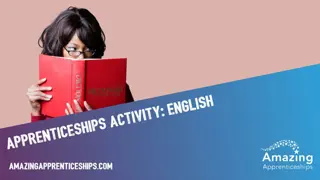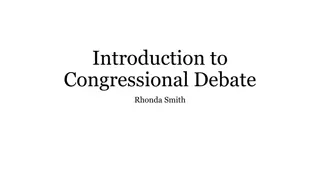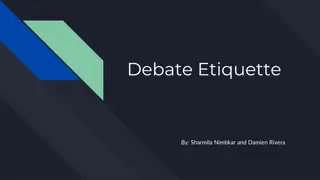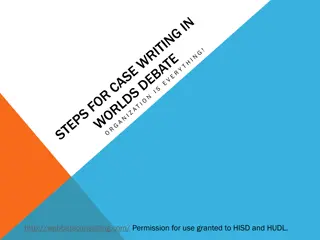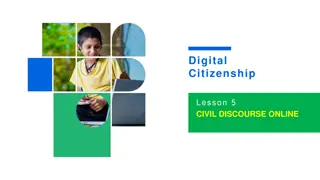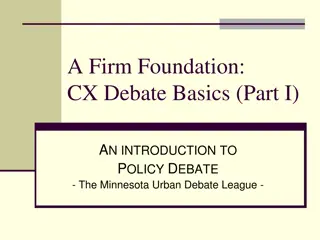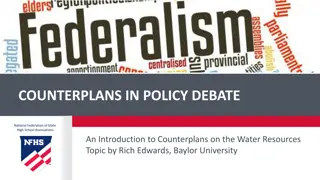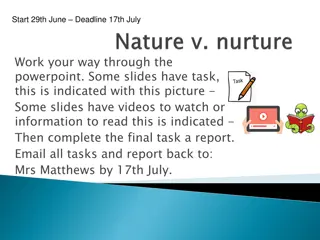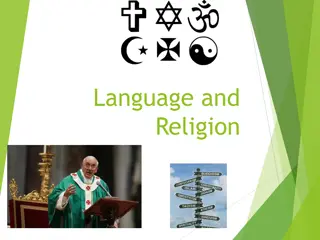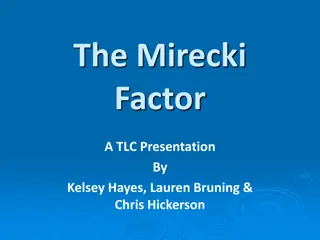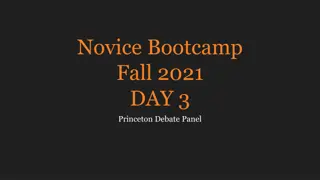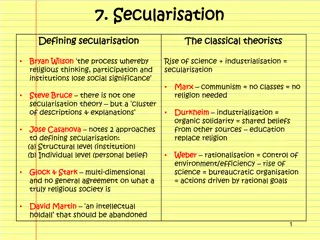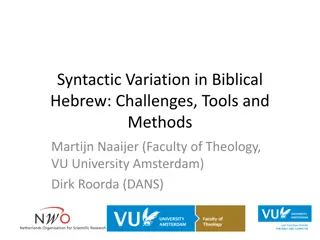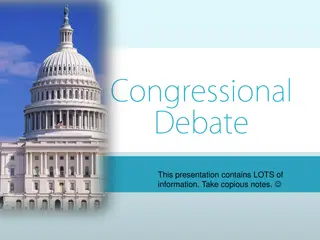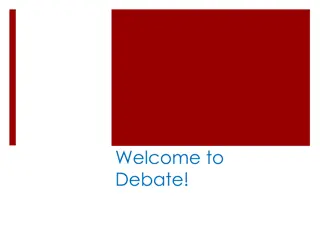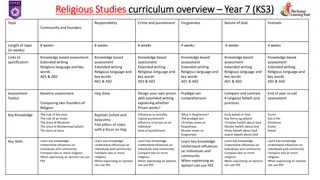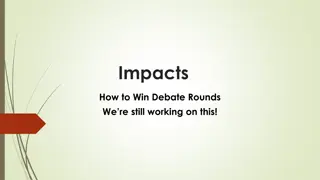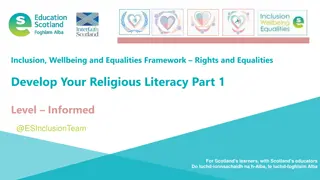Status of Family Laws in India: Hindu vs. Religious Minorities
The family and personal status laws in India vary between Hindu law and those pertaining to religious minorities. While Hindu law has seen extensive reforms, discriminatory provisions still exist. In contrast, laws governing religious minorities have undergone fewer reforms, leading to greater inequ
2 views • 4 slides
Debate on Uniform Civil Code in India: Recent Developments
Allahabad High Court is considering petitions from interfaith couples seeking protection for their marriages under Article 21. The debate on implementing a Uniform Civil Code (UCC) in India is sparked by the Prime Minister's recent call. UCC, outlined in Article 44 of the Indian Constitution, aims a
3 views • 4 slides
The Great Apprenticeship Debate: For or Against Apprenticeships
The lesson involves a debate on the merits of apprenticeships, with arguments for and against discussed. Students are encouraged to consider factors such as cost, time commitment, social life, workplace experience, and more. Debate rules emphasize the importance of using evidence, respecting others,
2 views • 7 slides
Essentials of Congressional Debate: Rules, Procedures, and Norms
Explore the key components of Congressional Debate including the types of legislation, preparation guidelines, contest norms, and dress code expectations. Learn about bills, resolutions, and constitutional amendments, and understand the importance of courteous behavior, proper attire, and effective
0 views • 27 slides
Mastering Debate Etiquette: A Comprehensive Guide
Enhance your debate skills with this comprehensive guide on debate etiquette. Learn about pre-debate introductions, flipping the coin, understanding judge paradigms, and in-round etiquette. Discover essential tips for interacting with opponents, making strategic decisions, and maintaining respect th
0 views • 8 slides
Understanding Religious Conflict: Definition and Types Explored
Religious conflict is a complex and recurring concept throughout history. Scholars have defined it as disagreements between religious groups. This conflict arises from contentious issues touching on ideology, morality, power, and identity, influenced by various socio-political, economic, and cultura
1 views • 13 slides
Evolution of Akbar's Religious Policy: A Historical Overview
In the 16th century, Akbar the Great implemented a revolutionary religious policy in the Mughal Empire. Initially a devout Sunni Muslim, Akbar evolved his stance to promote harmony and equality among all religions, fostering tolerance and understanding. This shift marked a significant departure from
1 views • 25 slides
Debate Framework for Capitalism vs. Communism
This debate framework presents a structured approach for arguing in favor of or against the motion that capitalism is superior to communism. It includes sections such as introduction, statement of the motion, definitions, and criteria or principles to guide the debate. Emphasis is placed on developi
0 views • 9 slides
Civil Discourse Online in Digital Citizenship Lesson 5
This lesson focuses on civil discourse online through a class debate about whether there should be homework assignments in school. Students engage in a structured Twitter debate, showcasing pros and cons in a respectful manner. Reflections on the debate encourage understanding differing viewpoints a
2 views • 10 slides
Elizabethan Religious Settlement: Unity Amidst Division
Amid religious division in England, Queen Elizabeth I implemented a Religious Settlement in 1559 to unify the country. The settlement, a blend of Protestant and Catholic elements, aimed to maintain peace and prevent rebellions. Elizabeth's strategic compromise pleased most people, though lingering t
0 views • 14 slides
Understanding Secularism: Principles and Advantages
Secularism is the principle of separating government institutions from religious entities to ensure equal rights for believers and non-believers. It safeguards freedom of religious belief and practice, upholds religious freedom, and promotes democracy and fairness. Secularism aims to prevent religio
0 views • 21 slides
An Introduction to Policy Debate: Understanding CX Debate Basics
Policy debate, also known as CX debate, involves structured arguments on policy topics. Teams of two students engage in constructive speeches and rebuttals, focusing on an annual resolution. Round structures, differences between constructive and rebuttal speeches, and debate strategies are key compo
0 views • 18 slides
Understanding Counterplans in Policy Debate
Counterplans in policy debate are alternative policies presented by the negative team that compete with the affirmative plan. They must be specific, competitive, and mutually exclusive to offer net benefits over the affirmative proposal. Nontopicality and competitiveness are debated aspects, with co
0 views • 10 slides
The Debate of Nature vs. Nurture in Personal Development
The nature vs. nurture debate in personal development explores the influence of genetic and biological factors (nature) compared to social, economic, and environmental factors (nurture). It raises questions on whether genetics or environment plays a stronger role in shaping behaviors, intelligence,
0 views • 14 slides
Understanding Religious Language: Cognitivism vs. Non-Cognitivism in the University Debate
This discussion explores the debate between cognitivism and non-cognitivism in religious language. Cognitivism asserts that religious claims aim to describe the world and can be true or false, while non-cognitivism argues that such claims express attitudes and cannot be verified. Flew's challenge qu
0 views • 9 slides
Guide to Using the BSA Calendar of Religious Observances
The BSA Calendar of Religious Observances is a valuable resource for scheduling scouting events in consideration of various religious holidays and observances. This guide provides an overview of the calendar, highlights important dates, and emphasizes the importance of respecting religious diversity
0 views • 8 slides
Understanding the Role of Language in Religion
Exploring the significance of language in religious contexts, this content discusses the functions, features, lexicon, grammar, and metaphorical aspects present in religious language. It delves into how religious language upholds spiritual beliefs, persuades believers, and expresses specific attitud
0 views • 8 slides
Understanding the Cultural Dimensions of Food and Religious Influences in Culinary Arts
Explore the impact of religious beliefs on food traditions and dietary restrictions across different cultures in the culinary world. Learn about the influence of major world religions on eating habits, food choices, and culinary practices. Discover how various religious groups, such as Christians, o
0 views • 26 slides
The Mirecki Factor: Controversy Surrounding Dr. Paul Mirecki's Religious Studies Class
The controversy surrounding Dr. Paul Mirecki's proposed class on Creationism and Intelligent Design at the University of Kansas in 2006 is detailed. It delves into the reactions from various stakeholders such as the administration, legislators, and critics, highlighting differing opinions on the tea
0 views • 13 slides
The Vital Role of Religious Institutions in Supporting Immigrants
Religions and immigration are interlinked in modern societies, where religions play a significant role in providing services, defending rights, and supporting the social cohesion of immigrants. Mainstream religious institutions serve as key actors in offering assistance, advocating for migrant right
2 views • 14 slides
Understanding Religious Language: Flew, Hare, Mitchell
Exploring the contrasting views of cognitivism and non-cognitivism in the context of religious language through the perspectives of Flew, Hare, and Mitchell. Delve into Flew's challenge on the undetectable gardener, Hare's concept of bliks, and Mitchell's response to the rationality of religious bel
0 views • 7 slides
Mastering Rebuttal Strategies in Debate: A Comprehensive Guide
Discover effective rebuttal techniques in debate such as nitpicking, mitigation, and offensive rebuttals. Learn how to strategically undermine your opponent's arguments by challenging their burdens, reducing the impact of their points, and presenting counter-arguments that strengthen your position.
0 views • 23 slides
Religious Accommodation in the Army: Advising Command
The content discusses the role of the Chaplain Corps in advising Soldiers and leaders on religious accommodation in the Army as of February 13, 2019. It covers learning objectives, legal foundations, Army policies, procedures, recent changes, and references related to religious accommodation. The in
0 views • 36 slides
An Overview of Debate: Propositions, Teams, and Formats
Debate is a regulated discussion between two matched sides discussing a proposition, with the affirmative arguing for change and the negative defending the status quo. The standard debate format involves constructive arguments followed by rebuttals from both sides. The roles in a debate include the
0 views • 47 slides
Understanding Religious Discrimination Laws in California Workplace
Learn about the regulations and protections under FEHA and Title VII in California, including religious exemptions, accommodation requirements, case studies, and best practices to address discrimination issues effectively. Discover the statistical insights on religious discrimination complaints and
0 views • 45 slides
Understanding Secularisation: The Decline of Religious Influence in Society
Secularisation refers to the process in which religious thinking, participation, and institutions lose their social significance. This phenomenon is influenced by factors such as the rise of science, industrialisation, changing social attitudes, and the disengagement of the church from society. Evid
0 views • 8 slides
Philosophers' Views on Religious Experience: Insights and Critiques
This lesson delves into the perspectives of various philosophers such as Rudolph Otto, Richard Swinburne, John Hick, and Michael Persinger on religious experiences. It explores concepts like the numinous, religious knowledge, God's existence, and criticisms on the validity of religious experiences.
0 views • 7 slides
Philosophers' Views on Religious Experience: Insights from William James
Explore William James' perspective on religious experiences, including his views on existential and value judgments. Understand how James argued for the validity of religious experiences and their potential proof of God's existence. Delve into the implications of emotions and prior beliefs on interp
0 views • 7 slides
Religious and Social Conflicts Fueling the Rise of Absolutism in Europe
Social, economic, and religious conflicts in Europe played a significant role in the emergence of absolutism where monarchs wielded supreme power without sharing it with legislative bodies. Events like Spain's religious conflicts, Protestantism in England, the Spanish Armada, religious conflict in t
0 views • 10 slides
Religious Pluralism and Civil Society: A Paradox in Government Control
Understanding the intricacies of religious pluralism in the context of government control reveals a paradox where restricting religion can hinder social cohesion and economic growth. Through insights on the counterproductivity of control, the role of religious organizations in civil society, and the
0 views • 16 slides
Challenges of Syntactic Variation in Biblical Hebrew
Linguistic variation in Biblical Hebrew has sparked a heated debate since 2000, challenging traditional dating methods and assumptions. The Structure Debate delves into syntactic variation and the use of the participle, while considering the differing language in Early Biblical Hebrew (EBH) and Late
0 views • 21 slides
US Religious Freedom Restoration Act (RFRA) Overview
The US Religious Freedom Restoration Act (RFRA) aims to protect the free exercise of religion by ensuring that governments do not substantially burden religious practices without compelling justification. It emphasizes striking a balance between religious liberty and governmental interests through t
0 views • 9 slides
Understanding Congressional Debate in the United States
This presentation delves into the nuances of Congressional Debate, a format modeled after the United States Congress where students debate proposed federal legislation. It covers key aspects such as types of legislation, vocabulary, roles like Senators/Representatives and Presiding Officer, parliame
0 views • 49 slides
Debate Formats Explained: CX vs. LD
Explore the world of debate with an overview of the CX (Cross-Examination) and LD (Lincoln-Douglas) formats. CX involves policy debates with teams advocating for and against resolutions related to US federal government policies, while LD focuses on one-on-one debates on values and philosophy. Discov
0 views • 11 slides
Religious Studies Curriculum Overview for Year 7 and 8 (KS3)
Explore various topics such as responsibility, crime and punishment, forgiveness, nature of God, festivals, community, founders, worship, creation, life after death, rules and laws, relationships in this detailed Year 7 and 8 (KS3) Religious Studies curriculum. The curriculum includes assessments, e
0 views • 6 slides
Tips for Being a Supportive and Equitable Debate Judge
When judging a debate, it is crucial to be supportive, equitable, and respectful of all participants. Providing opportunities for debaters to state their pronouns and important information, avoiding favoritism, and embracing diversity are key aspects of being a good judge. Actively listening, taking
0 views • 39 slides
Mastering Impact Calculus in Debate Rounds
Understand the importance of impacts in debate rounds, learn how to win by emphasizing impacts, compare economic suffering vs. illness during Covid-19, explore various impact comparisons like Economy vs. Environment, and grasp the significance of matters and comparisons in impacting. Practice your s
0 views • 18 slides
Everything You Need to Know About Novice LD Debate
In Novice LD Debate, participants like Abraham Lincoln and Stephen Douglas engage in one-on-one debates following specific time allocations for affirmative and negative arguments. The resolution defines the topic to be debated, such as propositions of fact, value, or policy. Debate resolutions chang
0 views • 34 slides
Developing Religious Literacy for Educators in Scotland
This resource aims to enhance educators' understanding of religious literacy by exploring religious discrimination, core beliefs of major faiths, and additional learning sources. It encourages educators to consider the needs of learners in relation to their religious beliefs in Scotland.
0 views • 30 slides
Settling the Northern Colonies: Religious Transformation and Colonization
The Protestant Reformation led to the emergence of Puritanism in the Northern Colonies, with figures like Martin Luther and John Calvin shaping religious beliefs. The Massachusetts Bay Colony stood as a beacon of self-government and religious ideals, while dissenters like Anne Hutchinson and Roger W
0 views • 9 slides


